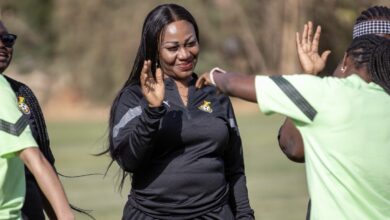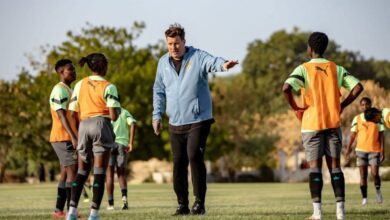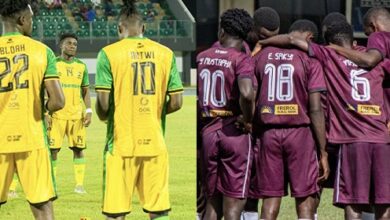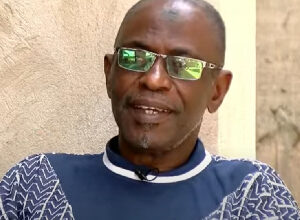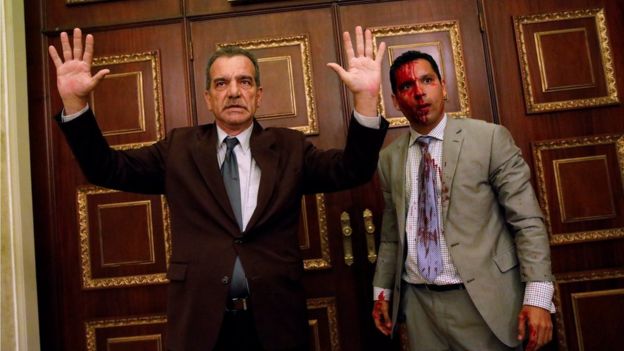
Dozens of government supporters have burst into Venezuela’s opposition-controlled National Assembly, injuring several lawmakers and journalists.
Witnesses said the fracas came after an assembly session to mark the country’s Independence Day.
The intruders brandished sticks and set off fireworks in the capitol building’s gardens, AFP reported.
Footage from the scene showed two opposition lawmakers with blood running down their faces.
Pro-opposition Venezuelan website La Patilla reported that several deputies had been attacked by a mob at the building in the capital, Caracas.
It said there were “several injured inside the AN (National Assembly) who were beaten by violent groups”.
Lawmaker Yajaira de Forero said three of her colleagues were hurt, including one who was taken away for medical treatment.
The injured are said to include opposition deputy Americo de Grazia.
Some local media reports put the number of wounded at eight.
The violence unfolded while President Nicolás Maduro was giving a speech at a government-planned Independence Day military parade elsewhere in the capital.
Before the intruders rushed the building, his Vice-President Tareck El Aissami had made an impromptu appearance in the congress with the head of the armed forces, Vladimir Padrino Lopez, and ministers.
Mr El Aissami gave a speech urging the president’s supporters to come to the legislature to show support for him.
A crowd had been rallying outside the building for several hours before breaking into the grounds.
What’s happening in Venezuela?
- The country is in a deep economic crisis, made worse by the falling price of oil, which accounts for about 95% of its export revenues and was used to finance some of the government’s generous social programmes. Forced to make cuts, Mr Maduro has seen his support erode among core backers
- Also as a result of the crisis, parts of Venezuela face severe shortages of basic supplies such as medicine and food
- The opposition accuses Mr Maduro of not only mismanaging the economy but also eroding the country’s democratic institutions
- In March, the Supreme Court decided it would take over the National Assembly. The decision was reversed, but Mr Maduro was accused by opponents of trying to stage a coup. That sparked almost daily protests calling for his resignation
- Meanwhile, Mr Maduro says the opposition is trying to illegally overthrow his government and blames the country’s problems on an “economic war” being waged against him
Venezuela’s National Assembly has been led by the opposition since elections in December 2015, and has become a focal point for critics of the president.
Anti-Maduro protesters have staged nationwide street protests against the government over the past three months which has seen violent clashes between demonstrators and the security forces.
At least 90 people have died in the bloodshed, with both political factions blaming each other.
Just hours before the scenes at the National Assembly, Venezuela’s attorney general was facing suspension for refusing to appear in court.
The charges filed against Luisa Ortega Díaz come after she challenged President Maduro’s reform plans.
The country’s chief prosecutor says she is being legally pursued for defying the president.
But the Supreme Court, which is dominated by government loyalists, says Ms Ortega has committed serious errors.
Last week, the court banned Ms Ortega from leaving the country and froze all her assets.
“We already know that today I will be removed from my post,” she told a news conference at the public prosecution department on Tuesday.
Last week, Ms Ortega strongly criticised President Maduro after an incident in which a stolen police helicopter flew over Caracas, dropping grenades and firing shots.
The president called it a “terrorist attack” but the chief prosecutor said the country was suffering from “state terrorism”.
While Venezuelan security forces later found the abandoned helicopter near the coast, opposition politician and parliamentary Speaker Julio Borges said there was a possibility that the incident was a hoax.
On Tuesday, the fugitive policeman who piloted the helicopter, Oscar Pérez, posted a video online saying he was still in Caracas.
He urged Venezuelans to stand firm in the streets in protests against President Maduro.
Source: BBC

